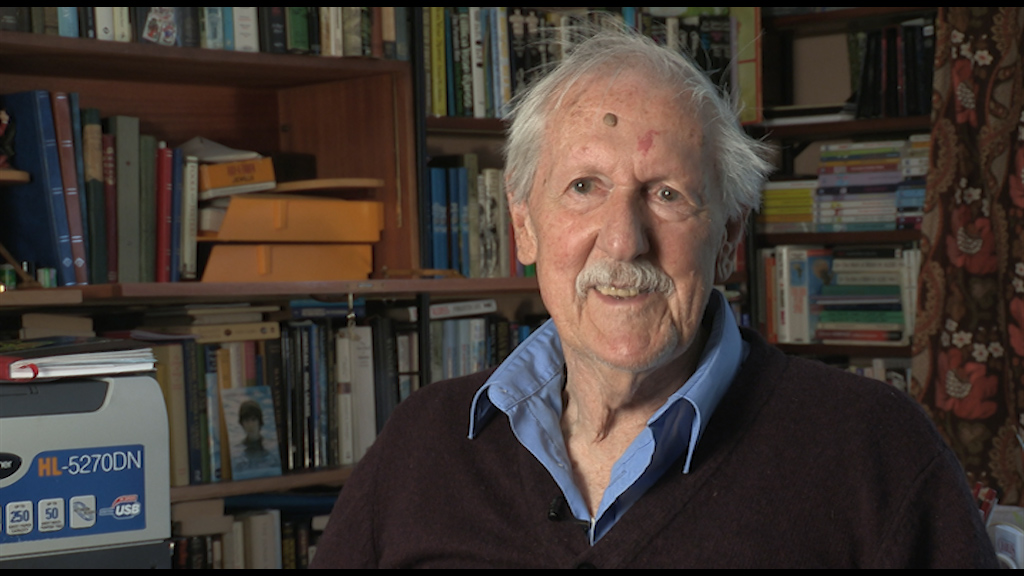NEXT STORY

How the British Army scuppered my plans for matrimony
RELATED STORIES

NEXT STORY

How the British Army scuppered my plans for matrimony
RELATED STORIES


|
Views | Duration | |
|---|---|---|---|
| 31. 'Going Dutch' in Sumatra | 42 | 02:54 | |
| 32. Giving barn dancing a whole new meaning | 34 | 04:26 | |
| 33. How the British Army scuppered my plans for matrimony | 33 | 04:45 | |
| 34. Killing time in Hong Kong | 33 | 03:23 | |
| 35. A dismal homecoming | 34 | 03:11 | |
| 36. Gaining work experience in Oxford’s bookshops | 43 | 03:27 | |
| 37. Creating The Brightfount Diaries | 49 | 04:57 | |
| 38. My journals in the Bodleian Library | 46 | 01:45 | |
| 39. Encountering TS Eliot | 79 | 01:48 | |
| 40. Colin Wilson in London | 61 | 01:35 |


And there was nothing for us to do, really. It's true now and then, a bullet or two would be exchanged, but there was nothing for us to do. But nearby to where, on the whole, we were situated, there was a large... it was always known as a barn – I suppose it had been a barn – a Dutch barn. And we had taken over this barn. So, the commanding officer, whose name began with a B... something like Bigress... I forget... he was an Indian, because I was then in 26th Indian Division, he called me in front of him and he said, 'Aldiss, I understand you are a painter'. 'Yes, sir, I am. I'm an artist'. 'Very good. Well now, I want you to take over this barn and decorate it with paintings, so that we can ask in the locals and give them something pleasant to think about'. 'Yes, sir!'
So, I moved into this marvellous barn. It had endless... not endless... it had several compartments, including, in the rear of it, delightful little living quarters! And so I moved out of my house and moved into those living quarters, and I had two sepoys to look after me and attend to all my needs and to clean the place. And, meanwhile, I was free to paint gigantic boards with whatever I fancied. And what I fancied, was women dancers. And so, some were gentle, nubile-looking local dancers, and some were big, fat Dutch lady dancers, and so on and so on. And this I did all round.
And the captain came round to see what I was doing, and I showed him, and he said, 'Very good, Aldiss. I shall have to...' – there's a term… an Army term for this – 're-coordinate what you are. You are no longer a Wireless Operator, you're a Draughtsman'. 'Very good, sir. Thank you, I'd like to be a Draughtsman'. 'I think you would like it, because it entails better pay'. 'Oh, thank you, sir'.
So, there we were, living in this marvellous barn. And I got in touch with a cinematic group who came and showed films – who knows, once a fortnight, maybe? And we could have beanos there for the men, but we could also have dances for the local women and men. And people were remarkably well behaved, quite extraordinary. Yes, they'd come and really enjoy themselves. And we had a band going, you know. Some Milwaukee beer, which was rather weak, and thoroughly enjoyed ourselves and it was all under my control. I was laughing, and really, when I look back, it's the one time in my life when I've actually been independent. Can you believe that? Well, it's not quite true, but it's almost the truth.
And that went on for some time.
Brian Aldiss (1925-2017) was an English writer and anthologies editor, best known for his science fiction novels and short stories. He was educated at Framlingham College, Suffolk, and West Buckland School, Devon, and served in the Royal Signals between 1943-1947. After leaving the army, Aldiss worked as a bookseller in Oxford, an experience which provided the setting for his first book, 'The Brightfount Diaries' (1955). His first science fiction novel, 'Non-Stop', was published in 1958 while he was working as literary editor of the 'Oxford Mail'. His many prize-winning science fiction titles include 'Hothouse' (1962), which won the Hugo Award, 'The Saliva Tree' (1966), which was awarded the Nebula, and 'Helliconia Spring' (1982), which won both the British Science Fiction Association Award and the John W Campbell Memorial Award. Several of his books have been adapted for the cinema. His story, 'Supertoys Last All Summer Long', was adapted and released as the film 'AI' in 2001. His book 'Jocasta' (2005), is a reworking of Sophocles' classic Theban plays, 'Oedipus Rex' and 'Antigone'.
Title: Giving barn dancing a whole new meaning
Listeners: Christopher Sykes
Christopher Sykes is an independent documentary producer who has made a number of films about science and scientists for BBC TV, Channel Four, and PBS.
Tags: barn, painting, dancing women, entertainment
Duration: 4 minutes, 26 seconds
Date story recorded/uploaded: 24 June 2015
Date story went live: 17 August 2015